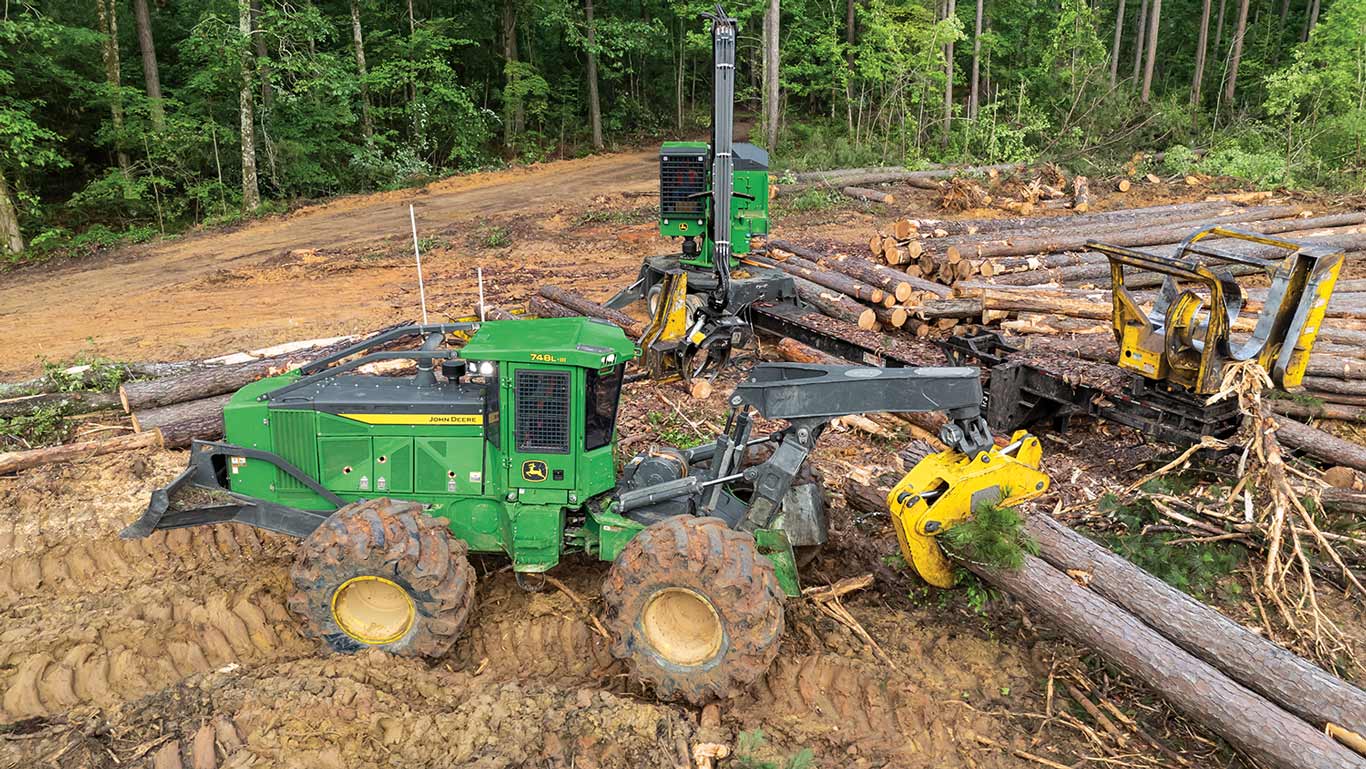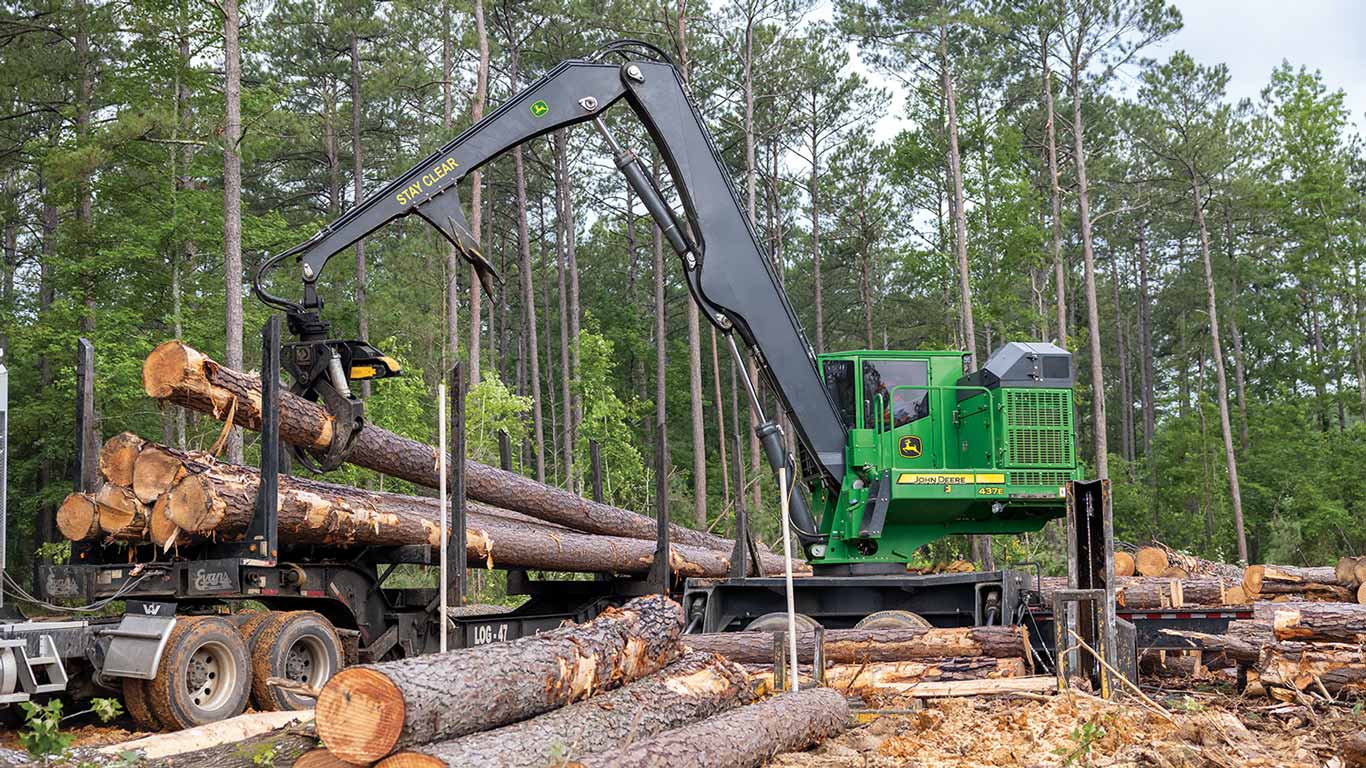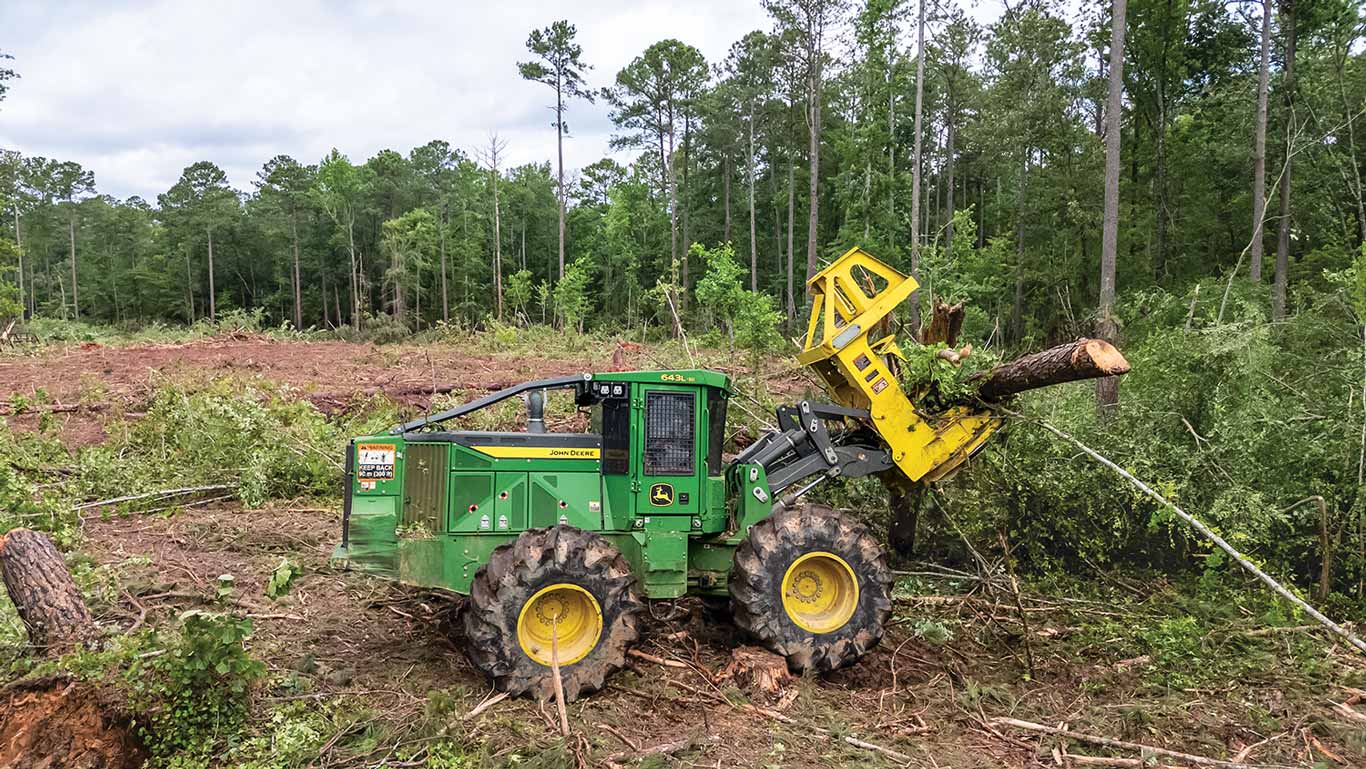Tech & Ten Logging Crews | Log Creek Timber | John Deere Forestry
Fall 2025
Country Life
From One Crew Into A Large, Diversified Company
![]() 7:30 MIN READ
7:30 MIN READ
"Leave the forest a better place than when you started" is a familiar maxim for loggers. But the pressure to maximize productivity and efficiency can make it challenging to implement environmentally friendly forest management practices. Through strong leadership, highly trained crews, and the latest technology, Log Creek Timber has found a way.
Welcome to Johnston, South Carolina, population 2,362. The town's water tower and official welcome sign reads, "Peach Capital of the World." Georgia may be considered the peach state, but South Carolina produces more.
The Williams family, owners of Log Creek Timber Inc. in Johnston, would know. Their father Theo was a peach farmer, among other things. Co-owners Tim Williams, Reg Williams, and Martha Sanders worked long hours on the family farm before helping their father and mother grow their fledgling logging business.
All three went off to college before returning to help grow the family business from a one-crew logging operation to a large, diversified company. What drew them back was life in a small town — good country living. "I have a friend who bought a farm in the country," says Tim. "He said it is the best thing, living in the city during the week and being able to come to the country on the weekend. I told him I had him beat. I live in the country all week and can go to the city if I want to on the weekends."
Farm Kids To Forest Pros
Farm kids to forest pros "We're farm kids, as Reg likes to say," says Martha.
The three co-owners of Log Creek Timber and their older sister, who became a nurse, grew up in Edgefield, approximately 7 minutes west of Johnston in southwest South Carolina and about 45 minutes north of Augusta, Georgia.
Their father owned a pig and cattle farm, a feed and seed store, and a peach orchard. At a young age, Martha and her sister would work at a roadside stand while Reg and Tim toiled in the peach fields. "Growing up, our dad expected a lot of us, and we gave a lot to him in return," says Reg. "I wasn't even aware there were Saturday morning cartoons," adds Tim. "We were always out in the field or working wherever."
The siblings acquired a strong work ethic and good business sense early on. "I remember Tim would calculate the peach pickers' payroll, including social security and taxes, at the age of ten," says Reg. "That was done with a calculator and pen back then."
To help pay for college for his four children, Theo decided to hire someone to cut his wood. "The guy gave him a price that was too high," Martha recalls. "So instead, he bought a truck and used the farm help to harvest it. That's how we got into the logging business."
Theo and his crew cut, skidded, and loaded pine logs while their mother, Elaine, handled the bookwork and ran errands. Reg returned home to log after earning a degree in ag economics in 1990. Tim earned a degree in business at Presbyterian College before entering the family business in 1993.
Martha also earned a business degree from Presbyterian College in 1986 but worked outside the family company for ten years.
In 1996, when she was pregnant with her daughter Rachel, Martha returned to help her mother with the bookkeeping. She remembers running errands with Rachel in a baby carrier. Today, Rachel works at a desk across from her, managing special projects for Reg. Six other people also work in the office, including Reg's wife Deanna, a CPA, and Tim's wife Susan.
The company started a second crew in 1997, just before Theo retired in 1998. He still stops by the office every morning for a cup of coffee.
In 2000, after hiring a forester to purchase its own wood, the company began to grow exponentially. By 2007, it was running four crews. "We've been very fortunate to find and retain a lot of good employees who have been instrumental to our success," says Tim. "We have a stellar workforce. I'm very proud that our turnover rate is so low."
People often ask him if he had a business plan. "No, I did not. It just evolved."
This seat-of-the-pants approach has worked out pretty well. Log Creek Timber was named the 2007 South Carolina Outstanding Loggers of the Year by the South Carolina Forestry Association. More recently, the company was recognized as the 2018 Logging Business of the Year by Timber Harvesting magazine.

"We have purchased almost 100 Deere machines over the years."
Good People, Good Hearts
Scott Saxon is Log Creek's direct contact with John Deere Research and Development and with Deere's technology on a daily basis. Saxon is one of Log Creek Timber's procurement forester, and is a man on the move. It isn't unusual for him to receive over 100 messages and calls a day. "It gets a little crazy," he says. "Just keep moving."
Saxon's to-do list is long, and time always seems to be short. Inspect logging jobs, buy wood, handle wood orders, and mill quotas to optimize crew efficiencies. That's a lot of responsibility.
Saxon grew up with the children of the Williams family. "They're great people," he says. "They're always there to support you. They'd help anybody out."
The family offered Saxon a job after he graduated with a degree in forest management from Clemson University. Tim, who manages procurement and logging operations, took him under his wing. "He was my football coach in high school," says Saxon. "He's still got my back." Tim, who played offensive line in college, is accustomed to that role.
Saxon appreciates the trust the company has put in him: "The three of them just said, ‘We know you know what you're doing. Handle it how you see best.'" That has meant the world to him. Scott has a lot of guidance from his senior timber buyers Mark Swanson, Chris Proctor, Robert Tripp, and Jeremy Yonce.
"Log Creek does a good job of providing the resources to accomplish your job," adds Saxon. "They provide for technology, accounting, human resources, timber settlements, the shop, and support staff, along with proficient company-owned crews and trucks."
"We take pride in what we do, and we do everything to the best of our ability," Saxon reflects. "Log Creek is centered around good people with good hearts. We just want to do what's best for every landowner and everyone involved."
Technology Critical To Success
Saxon is in constant contact with the mills and crews, instructing each crew on what to haul and making adjustments on the fly. "Things can change at the drop of a hat," he observes. "Mills shut down or a crew has an issue. Technology plays a pivotal role in trying to keep up with everything."
Technology provides the backbone for Log Creek Timber to manage logging crews and its large fleet of forestry equipment and trucks. The company employs 30 truck drivers, seven J.B. Hunt trucks and approximately nine independent contract truckers, and 35 people in the woods, running over 30 John Deere forestry machines. The company contracts with mills to purchase pulpwood and sawlogs from private landowners and government tracts.
In the "war room," a logistical staff dispatches and monitors trucks. The company uses the John Deere Operations Center™ to track its forestry equipment, proactively monitor machine health, diagnose issues remotely, and minimize downtime.
The company also uses John Deere TimberMatic™ Maps and TimberManager™ to plan and monitor logging operations. "It's been a game changer," says Saxon. "Detailed maps save us a lot of legwork walking the site. We can mark cut boundaries and areas of soft ground as well as other features of interest, ensuring we don't rut the ground or pollute rivers. We can also see what wood has been cut and monitor the progress on the tract, so we can log sustainably but still maximize production and efficiency."
TimberManager enables the company to monitor jobs remotely using a smartphone, tablet, or PC. "We can track idle time, fuel costs, and tons produced per run time," says Reg.

"We can track idle time, fuel costs,
and tons produced per run time."
Standing Behind The Logo On The Front
Today, Log Creek Timber runs nine company logging crews and three contract crews. It hauled 850,000 tons of wood in 2024, down from the previous million tons annually, due to mill closures. The company also owns a NAPA® store and a car-care center.
The mill closures are a significant concern. The company has shifted logging operations to clear-cut tracts that produce sawlogs and ply logs and fewer people. Diversification has helped. "The NAPA store has grown a lot in the last five years," says Reg. "It has been a very successful business."
Maximizing efficiency is also key. "We recently purchased larger John Deere skidders to handle the amount of work we used to handle with two skidders," says Martha. It increases efficiency but we have to make sure it can keep up with the number of trucks and the log loader."
Recently, the company has been testing the new John Deere 748L-III Skidder and 643L-III Feller Buncher (see related article, page 22). "John Deere has put a lot of effort into listening to our guys in the shop and the woods, and made changes to make us more efficient," says Martha. "That's why they're still around. They listen to their customers."
Log Creek Timber began running John Deere equipment in 1996. "We have purchased almost 100 Deere machines over the years," says Tim. "But just as important as the logo on the front of the machine are the people who stand behind the machines at the local dealership. We've gotten great service from Dobbs Equipment. Our salesman Todd Ingram is the right guy for the job."
Like many logging companies, Log Creek Timber is struggling to fi nd young people to carry the torch, Martha's daughter Rachel being an exception. Whether the company's legacy will continue with the next generation of the Williams family or be led by talented people within the organization remains to be seen. One thing is sure. The trio of current owners has provided a solid foundation for future success.
"Our father started out working at a feed and seed store and ended up buying it. He raised hogs for years but had to quit because prices had become so low. He planted peaches, but they froze. So he started logging. He just did whatever he needed to do to diversify and survive." Much like Log Creek Timber "Ultimately, what has been most satisfying is trying to do the job right," says Tim, "and giving good people steady employment and benefits."
"I'm proud that my dad started this business and that my brothers and I have kept it going," adds Martha. "It's a great industry, and the people who do it love it."
Log Creek Timber is serviced by Dobbs Equipment, Grovetown, Georgia.
Related Articles
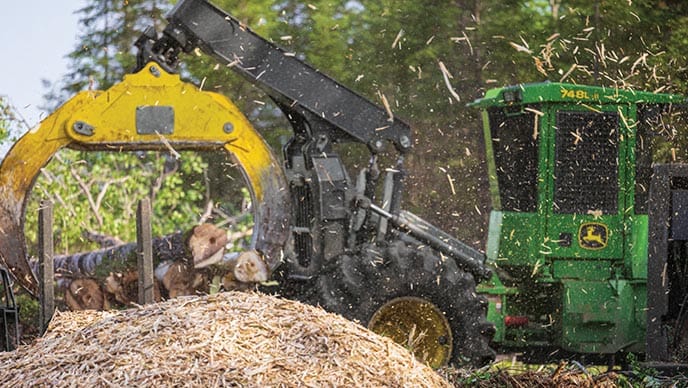
When the Chips Are Down
The people at Carlson Timber Products are there for each other, even in the toughest times.
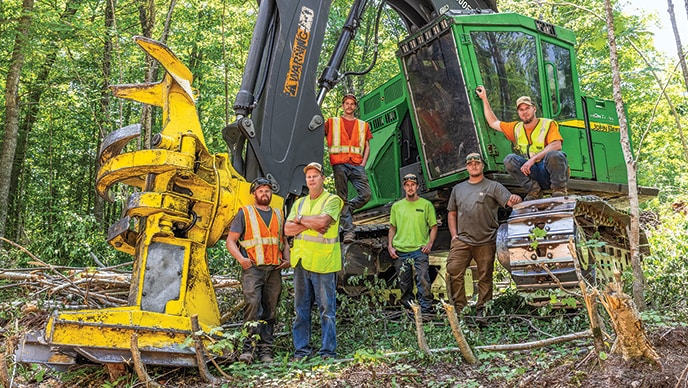
Front Man
A multigenerational logging company finds success by embracing teamwork and new technology.

The Marshall Plan
Marshall Logging continues eight decades of logging by adapting to change and adopting new technology.
Do you think your company's story would resonate with others in the logging industry?
SHARE YOUR JOURNEY

